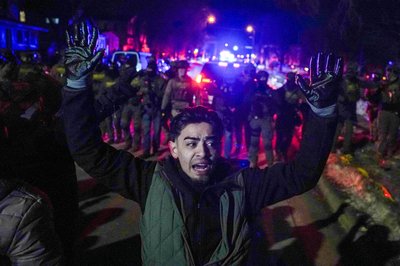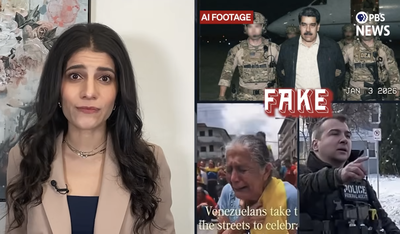Summary
There are many myths and much disinformation circulating online, including those related to the pandemic. Fox News host Tucker Carlson made headlines on Monday for his anti-mask stance that included false claims. To explain how and why similar falsehoods spread, Amna Nawaz is joined by Graham Brookie, the director of the Digital Forensic Research Lab at the Atlantic Council.- Brookie says that in cases of viral disinformation or misinformation such as the claim that Biden is planning to outlaw meat consumption, "the original falsehood is always going to reach more people than the correction."
- As an example, even after FOX News retracted its claim that Biden was proposing enforcement of limits to meat consumption, House Minority Leader Kevin McCarthy echoed the original falsehood days later, soon after Biden's joint address to Congress on Wednesday.
- Brookie also says that people everywhere can help fight misinformation or disinformation by looking for the source of information before spreading it ourselves through social media or in conversation.
Five Facts
- Who is spreading disinformation about the Biden administration, according to this piece?
- What is disinformation?
- When and Where are Americans exposed to purposeful disinformation"
- Why is disinformation dangerous even if it's corrected?
- How can individuals evaluate good information from bad, according to this interview?
Focus Questions
Why do you think that misinformation or disinformation reaches more people than corrections that might follow? What do you think are some effective ways to combat misinformation in the media and online? Do you think there are incentives for politicians or broadcasters to avoid misinformation? If so, what are those incentives? Media Literacy: In this interview, Graham Brookie says that "FOX News exists by an entire ecosystem and has a lot of amplification and reach, that doesn't necessarily exist for types of misinformation from other ideological ends of the spectrum in the United States at this point." Do you think other experts might disagree with Brookie that disinformation is especially prevalent in right-leaning media? How do you think experts could determine whether this is true or not?For More
- Is there a difference between misinformation and disinformation? Use this lesson to discuss.
- How can you determine what's good information and what isn't when you're looking things up online? Use this lesson to discuss.
- Watch Conservatives beef with Biden over false red meat claims to learn more about how misinformation spreads.





